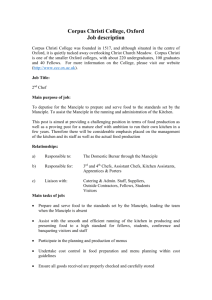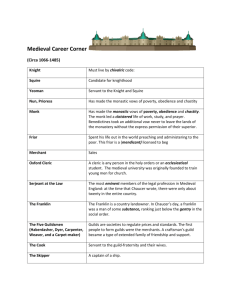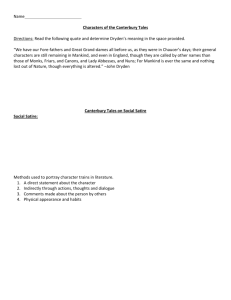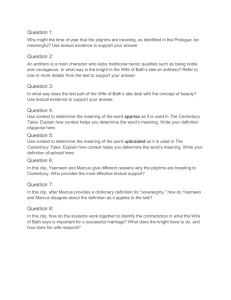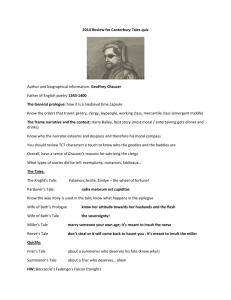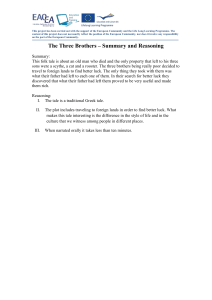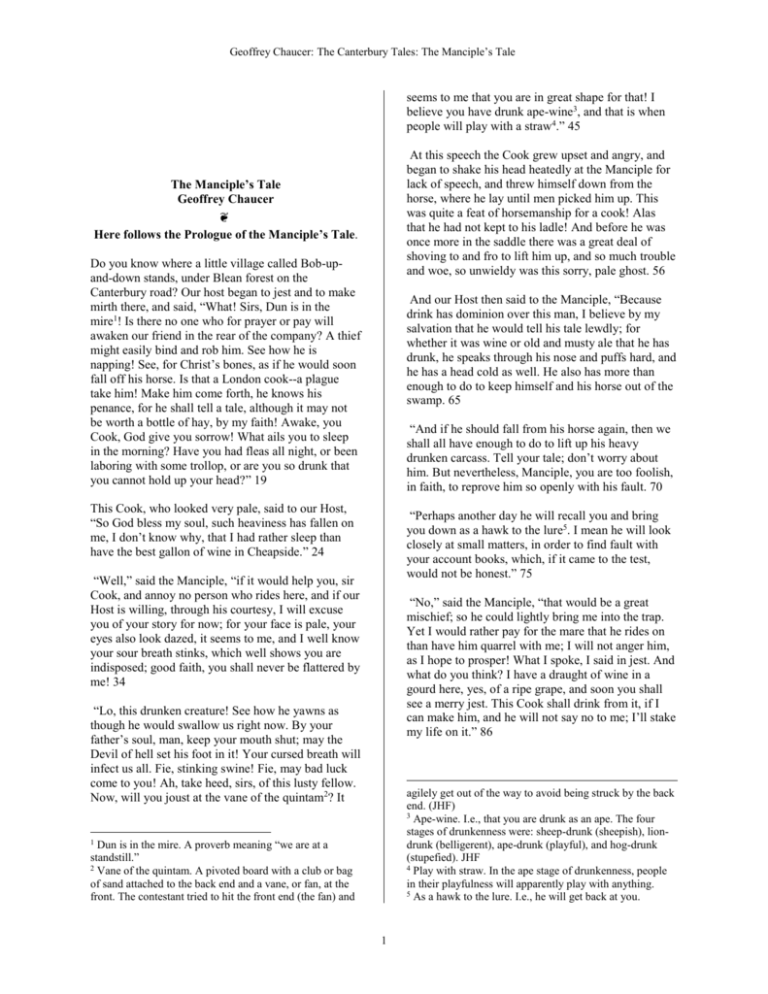
Geoffrey Chaucer: The Canterbury Tales: The Manciple’s Tale
seems to me that you are in great shape for that! I
believe you have drunk ape-wine3, and that is when
people will play with a straw4.” 45
At this speech the Cook grew upset and angry, and
began to shake his head heatedly at the Manciple for
lack of speech, and threw himself down from the
horse, where he lay until men picked him up. This
was quite a feat of horsemanship for a cook! Alas
that he had not kept to his ladle! And before he was
once more in the saddle there was a great deal of
shoving to and fro to lift him up, and so much trouble
and woe, so unwieldy was this sorry, pale ghost. 56
The Manciple’s Tale
Geoffrey Chaucer
❦
Here follows the Prologue of the Manciple’s Tale.
Do you know where a little village called Bob-upand-down stands, under Blean forest on the
Canterbury road? Our host began to jest and to make
mirth there, and said, “What! Sirs, Dun is in the
mire1! Is there no one who for prayer or pay will
awaken our friend in the rear of the company? A thief
might easily bind and rob him. See how he is
napping! See, for Christ’s bones, as if he would soon
fall off his horse. Is that a London cook--a plague
take him! Make him come forth, he knows his
penance, for he shall tell a tale, although it may not
be worth a bottle of hay, by my faith! Awake, you
Cook, God give you sorrow! What ails you to sleep
in the morning? Have you had fleas all night, or been
laboring with some trollop, or are you so drunk that
you cannot hold up your head?” 19
And our Host then said to the Manciple, “Because
drink has dominion over this man, I believe by my
salvation that he would tell his tale lewdly; for
whether it was wine or old and musty ale that he has
drunk, he speaks through his nose and puffs hard, and
he has a head cold as well. He also has more than
enough to do to keep himself and his horse out of the
swamp. 65
“And if he should fall from his horse again, then we
shall all have enough to do to lift up his heavy
drunken carcass. Tell your tale; don’t worry about
him. But nevertheless, Manciple, you are too foolish,
in faith, to reprove him so openly with his fault. 70
This Cook, who looked very pale, said to our Host,
“So God bless my soul, such heaviness has fallen on
me, I don’t know why, that I had rather sleep than
have the best gallon of wine in Cheapside.” 24
“Perhaps another day he will recall you and bring
you down as a hawk to the lure5. I mean he will look
closely at small matters, in order to find fault with
your account books, which, if it came to the test,
would not be honest.” 75
“Well,” said the Manciple, “if it would help you, sir
Cook, and annoy no person who rides here, and if our
Host is willing, through his courtesy, I will excuse
you of your story for now; for your face is pale, your
eyes also look dazed, it seems to me, and I well know
your sour breath stinks, which well shows you are
indisposed; good faith, you shall never be flattered by
me! 34
“No,” said the Manciple, “that would be a great
mischief; so he could lightly bring me into the trap.
Yet I would rather pay for the mare that he rides on
than have him quarrel with me; I will not anger him,
as I hope to prosper! What I spoke, I said in jest. And
what do you think? I have a draught of wine in a
gourd here, yes, of a ripe grape, and soon you shall
see a merry jest. This Cook shall drink from it, if I
can make him, and he will not say no to me; I’ll stake
my life on it.” 86
“Lo, this drunken creature! See how he yawns as
though he would swallow us right now. By your
father’s soul, man, keep your mouth shut; may the
Devil of hell set his foot in it! Your cursed breath will
infect us all. Fie, stinking swine! Fie, may bad luck
come to you! Ah, take heed, sirs, of this lusty fellow.
Now, will you joust at the vane of the quintam2? It
agilely get out of the way to avoid being struck by the back
end. (JHF)
3 Ape-wine. I.e., that you are drunk as an ape. The four
stages of drunkenness were: sheep-drunk (sheepish), liondrunk (belligerent), ape-drunk (playful), and hog-drunk
(stupefied). JHF
4 Play with straw. In the ape stage of drunkenness, people
in their playfulness will apparently play with anything.
5 As a hawk to the lure. I.e., he will get back at you.
Dun is in the mire. A proverb meaning “we are at a
standstill.”
2 Vane of the quintam. A pivoted board with a club or bag
of sand attached to the back end and a vane, or fan, at the
front. The contestant tried to hit the front end (the fan) and
1
1
Geoffrey Chaucer: The Canterbury Tales: The Manciple’s Tale
And truly, to tell it all, the Cook drank deep out of
this vessel, alas! What need did he have? Already he
had drunk enough. And when he had blown in this
horn, he handed the gourd back to the Manciple. And
he was extremely glad for this drink and thanked him
in such a fashion as he was able. 93
Now this Phoebus had in his house a wife whom he
loved more than his soul, and was ever busy night
and day to please her and treat her with respect,
except only, if I am to tell the truth, that he was
jealous and anxious to guard her well; for he was
loath to be tricked. And so is every creature in this
case, but all in vain; it does not help. A good wife,
clean in deed and thought, should not be watched, in
truth; and truly the labor is in vain to watch an evil
one, for that can not be done. This I believe to be true
folly, to waste labor in watching wives; thus write old
scholars. 154
Then our Host began to laugh marvelously loud and
said, “I well see we will need to carry good drink
with us wherever we go for that will turn rancor and
discomfort into accord and love, and appease many
wrongs. O Bacchus6, blessed is your name, which so
can turn earnest to sport. Worship and thanks to your
godhead! But you will get no more of that from me!
Tell your tale, Manciple, I pray you.” 103
But now to my purpose, as I first began. This worthy
Phoebus did all he could to please her, thinking that
with such pleasure and with his manhood and
handsome looks nobody should remove him from her
grace. But this, God knows, no man can control; to
constrain a thing that Nature has placed in a
creature’s very being. 162
“Well, sir,” the Manciple said, “now listen.” 104
Thus ends the Prologue of the Manciple.
Here begins the Manciple’s Tale of the Crow.
Take any bird, put it in a cage, and set your mind and
heart all on fostering it tenderly with food and drink,
with all dainty things you can imagine, and keep it as
cleanly as you can; even if its cage may be ever so
delightful with gold, this bird would still twenty
thousand times rather go eat worms and other such
wretched things from the cold and crude forest. For
he will do his best at all times to escape from his
cage, if he can; this bird always desires his liberty.
174
When Phoebus dwelt down here on this earth, as old
books make mention, he was the hardiest young
knight in this entire world, and the best archer as
well. He slew Python, the serpent, one day as he lay
sleeping in the sunshine; and he completed many
other noble worthy achievements with his bow, as
one may read. 112
He could play on every type of instrument, and sing
in such a way that it was a heavenly melody to hear
the sound of his clear voice. Surely Amphion, king of
Thebes, who walled that city by his singing, could
never sing half so well as he. And he was the
seemliest man that is or was since the world was
made. What need is there to describe his features?
For no man so handsome lived in this world.
Likewise, he was full of gentle manners, of honor and
of perfect worthiness. 124
Take a cat, and foster him well with cream and
tender meat and make him a silken couch; and let a
mouse run by the wall. At once he forgets cream and
fine meat and every dainty thing in that place, as he
has such an appetite to eat a mouse. Lo, here desire
has its dominion, and appetite banishes discretion.
182
A she-wolf also has a villainous low nature; at the
time when she wishes to have a mate, she will take
the most scurvy wolf she can find, or the one of least
honor. 186
This Phoebus, flower of all young men in both
chivalry and in generosity, for his sport and also in
sign of his victory over Python, as the history tells us,
was accustomed to bear a bow in his hand. Now this
Phoebus had in his house a crow, which he fostered
for a long time in a cage and taught to speak, as one
may teach a jay. This crow was white as a snowwhite swan, and when he was to tell a tale, could
counterfeit the speech of every man. And no
nightingale in this entire world could sing one
hundred thousandth as merrily or well. 138
6
I speak all these examples concerning these men
who are untrue--and never a bit concerning women!
For men always have a wanton appetite to take their
pleasure with lower creatures than their wives, no
matter how beautiful or true or meek they may be.
Flesh is so eager for something new—unfortunately-that not for long can we find pleasure in anything that
leads with virtue. 195
This Phoebus thought of no deceit, and was deceived
for all his good-heartedness; for behind his back she
Bacchus. God of wine.
2
Geoffrey Chaucer: The Canterbury Tales: The Manciple’s Tale
had another, a man of small reputation, worth nothing
in comparison to Phoebus, which made it more
painful! Thus it often happens, and much harm and
woe comes from it. 202
told him once and again that he had seen it with his
eyes. 261
This Phoebus turned away; it seemed to him his
sorrowful heart would burst in two. He bent his bow
and set an arrow in it, and then in his rage he slew his
wife. This is the conclusion; there is no more to say.
And for sorrow of this he broke his instruments of
music, his harp, lute, gittern, and psaltery7; and he
broke also his arrows and bow. 269
And so it happened when Phoebus was away that his
wife sent then after her lover. Lover? This is a
churlish word surely; forgive me for it, I pray you.
The wise Plato says, as you may find in the books,
that word and act must be in agreement; if a one shall
tell a thing as it is, the word must be cousin to the
deed. I am a plain man, I speak just so: there is truly
no other difference between a wife of high degree
that is dishonest with her body, and a poor wench,
other than this: if they both act wrongly, the
gentlewoman, high in estate, shall be called his lady
in love; and because the other is a poor woman, she
shall be called his wench or his lover. And God
knows, my own dear friend, men lay the one as low
as the other. 222
And after that he spoke thus to the bird: “Traitor,” he
said, “with a scorpion’s tongue you have brought me
to destruction. Alas that I was ever created! Why am
I not dead? O dear wife, gem of delight, who was so
constant to me and so faithful, now you lie dead with
face pale of hue, so guiltless, that I dare truly swear!
O rash hand, to do so foul a wrong! O troubled mind,
O reckless anger, that heedlessly strikes the guiltless!
O distrust, full of false suspicion, where was your
wisdom and discernment? Let every man beware of
rashness, and believe nothing without strong
testimony; do not strike too soon, before you know
why, and consider soberly and well before in wrath
you execute anything upon suspicion. Alas! Rash
anger has fully destroyed a thousand people, and
brought them to the dust. Alas! I will slay myself for
sorrow!” 291
Just as between a usurping tyrant and an outlaw or a
roving thief, I say the same: there is no difference.
This definition was told to Alexander, because the
tyrant is of greater power by the force of his retainers
to slay downright and to burn house and home and
lay everything low, behold, he is therefore he is
called a captain; and because the outlaw has only a
small band and cannot do such great harm nor bring a
country to such harm, men call him an outlaw or a
bandit. But because I am not a bookish man, I will
not retell any more sayings from books, but I will go
to my tale, as I began. 237
And to the crow he said, “O false thief, from this
point I will pay you back you for your false talk! You
sang once like a nightingale; now, false thief, you
shall forego your song and all your white feathers as
well, and never in all your life shall you speak again.
Thus shall men be avenged on a traitor; you and your
offspring shall forever be black, and shall never make
sweet sound but always cry before the tempest and
rain, as a sign that through your fault my wife is
dead.” 302
When Phoebus’ wife had sent for her lover, the
white crow, which always hung in the cage, watched
them, and never said a word. And when Phoebus the
lord had come home, this crow sang “Cuckoo!
cuckoo! cuckoo!” 243
“What, bird!” said Phoebus. “What song are you
singing? Were you not accustomed to sing so merrily
that it was a joy to my heart to hear your voice? Alas,
what song is that?” 247
And he rushed upon the crow, and swiftly plucked
out every one of his white feathers and made him
black, and bereft him of his song and of his speech as
well, and slung him out the door to the Devil, to
whom I commit him! And for this cause all crows are
black. 308
“By the Lord,” he said, “I am not singing the wrong
thing.. Phoebus,” he said, “despite all your worth,
your beauty and your noble birth, despite all your
sweet singing and all your melody, and despite all
your vigilance, you have been hoodwinked by a man
of small reputation, not worth a gnat alongside you,
by my head!” 256
Gentle people, by this example I pray you to take
heed, and mark what I say: as long as you live never
tell a man of his wife’s frailty; in truth he will
mortally hate you. Sir Solomon, as wise scholars say,
What more would you like to know? Soon the crow
told him, by trusty tokens and bold words, how his
wife had sinned, to his great shame and reproach; and
7
Gittern and psaltery. Gittern: a stringed instrument
resembling a guitar. Psaltery: another stringed instrument
that is usually played on the lap.
3
Geoffrey Chaucer: The Canterbury Tales: The Manciple’s Tale
teaches a man to guard his tongue well8; but as I said,
I have no book-learning. 316
© Copyright, 2007, All Rights Reserved
Citation. Chaucer, Geoffrey. The Manciple’s Tale.
NeCastro, Gerard, ed. and trans. eChaucer:
http://www.umm.maine.edu/faculty/necastro/chaucer
Yet thus my mother taught me: “My son, in God’s
name, think carefully about the crow! “My son, hold
your tongue and keep your friend. A bitter tongue is
worse than a devil; my son, as one may bless
themselves against a devil9. My son, God, through
His endless goodness, formed a wall around the
tongue with teeth and lips as well, because one
should consider well what one speaks. My son, many
have been undone on account of too much speech, as
scholars teach; but nobody is ever harmed for little
speech cautiously given. 328
“My son, you should restrain your tongue at all
times, except when you take pains to speak of God in
worship and prayer. The first virtue, son, if you will
learn it, is to restrain and guard well your tongue;
children learn this when they are young. My son,
there comes great harm of much speech and illadvised, where less speech would have been enough;
so was I told and taught. In much speaking there is no
lack of sin. 338
“Do you know what a rash tongue results in? Just as
a sword cuts and carves an arm in two, so, my dear
son, a tongue cuts friendship in two. A prattler is
abominable to God: read Solomon so worthy and
wise, read David in his psalms, read Seneca. My son,
speak not, but nod with your head. Make as if you
were deaf, if you hear any gossip speak of perilous
matters. The Flemish say (and learn this, if you
please), that ‘little prattling causes much rest.’ 350
“My son, if you have said no ill word, you need not
fear to be betrayed; but one who has spoken ill, I
affirm, can in no way recall those words. 354
“What is said, is said; it goes forth, whether or not
one repents, or however unfavorable it may be. One
is a slave to whom one has spoken a thing for which
one is sorry now. My son, beware, and do not be the
author of any new tidings, whether they are true or
false. Wherever you go, among gentle or simple
people, guard your tongue well, and think carefully
about the crow.” 362
Here is ended the Manciple’s Tale of the Crow.
Translated and Edited by Gerard NeCastro
8
Guard his tongue well. Proverbs 21.23.
Against a devil. By saying a prayer or making the sign of
the cross one could presumably be shielded from the devil.
9
4


